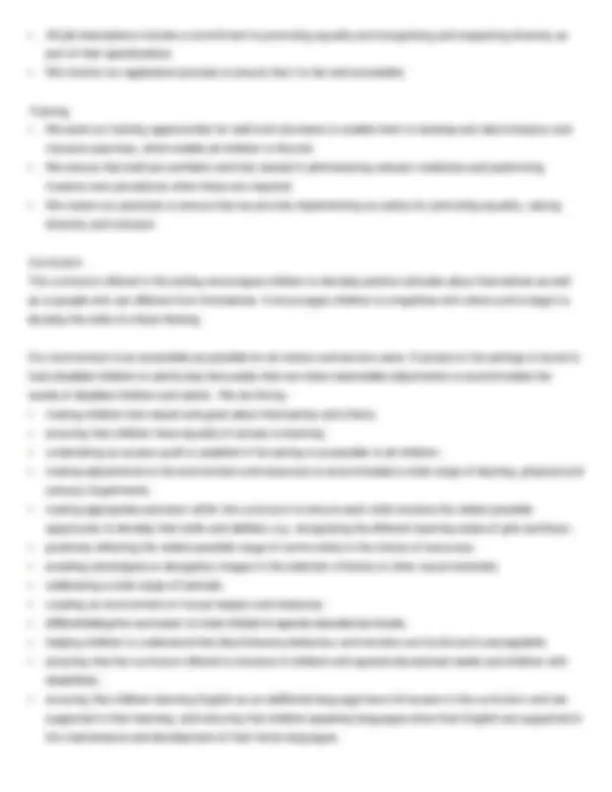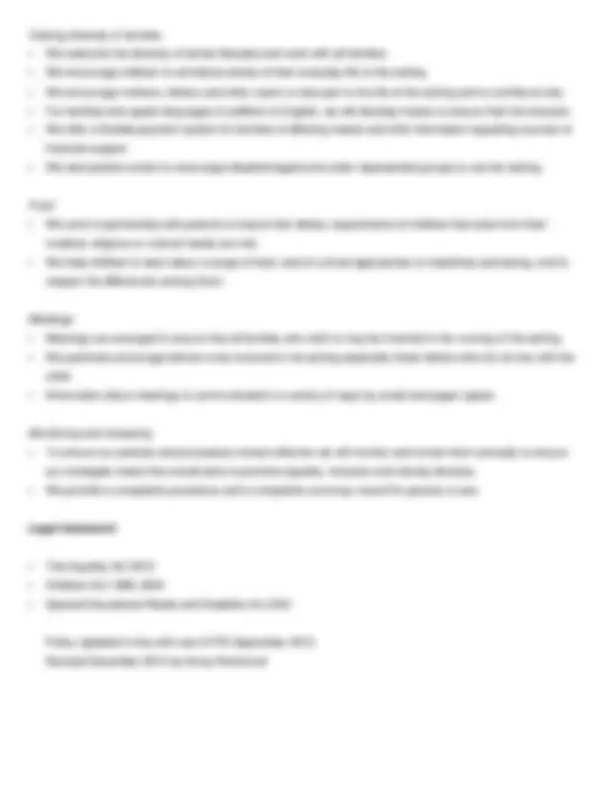




Study with the several resources on Docsity

Earn points by helping other students or get them with a premium plan


Prepare for your exams
Study with the several resources on Docsity

Earn points to download
Earn points by helping other students or get them with a premium plan
Community
Ask the community for help and clear up your study doubts
Discover the best universities in your country according to Docsity users
Free resources
Download our free guides on studying techniques, anxiety management strategies, and thesis advice from Docsity tutors
The policies and procedures of a nursery setting to promote equality of opportunity and valuing diversity for all children and families. It covers admissions, employment, training, curriculum, valuing diversity in families, food, meetings, monitoring and reviewing, and the legal framework. The setting is committed to anti-discriminatory practice and aims to provide a secure and inclusive environment for children from diverse backgrounds.
Typology: Slides
1 / 4

This page cannot be seen from the preview
Don't miss anything!



General Safeguarding and Welfare Requirement: Equal opportunities Providers must have and implement a policy, and procedures, to promote equality of opportunity for children in their care, including support for children with special educational needs or disabilities.
Policy statement We will ensure that our service is fully inclusive in meeting the needs of all children. We recognise that children and their families come from diverse backgrounds. All families have needs and values that arise from their social and economic, ethnic and cultural or religious backgrounds. Children grow up in diverse family structures that include two parent and one parent families; some children have two parents of the same sex. Some children have close links with extended families of grandparents, aunts, uncles and cousins while others may be more removed from close kin or may live with other relatives or foster carers. Some children have needs that arise from disability or impairment or may have parents that are affected by disability or impairment.
Some children come from families who experience social exclusion or severe hardship; some have to face discrimination and prejudice because of their ethnicity, the languages they speak, their religious or belief background, their gender or their impairment.
We understand that these factors affect the well-being of children and can impact on their learning and attainment.
Our setting is committed to anti-discriminatory practice to promote equality of opportunity and valuing diversity for all children and families. We aim to: provide a secure and accessible environment in which all our children can flourish and in which all contributions are considered and valued; include and value the contribution of all families to our understanding of equality and diversity; provide positive non-stereotyping information about gender roles and diverse family structures, diverse ethnic and cultural groups and disabled people; improve our knowledge and understanding of issues of anti-discriminatory practice, promoting equality and valuing diversity; challenge and eliminate discriminatory actions; make inclusion a thread that runs through all of the activities of the setting; and foster good relations between all communities.
Procedures Admissions Our setting is open to all members of the community. We advertise our service widely.
We provide information in clear, concise language, whether in spoken or written form. We base our admissions policy on a fair system. We ensure that all parents are made aware of our equal opportunities policy. We do not discriminate against a child or their family, or prevent entry to our setting, on the basis of a protected characteristic as defined by the Equalities Act 2010. These are:
- disability; - race; - gender reassignment; - religion or belief; - sex; - sexual orientation; - age; - pregnancy and maternity; and - marriage and civil partnership. We do not discriminate against a child with a disability or refuse a child entry to our setting for reason relating to disability. We develop an action plan to ensure that people with impairments can participate successfully in the services offered by the setting and in the curriculum offered. We take action against any discriminatory behaviour by staff or parents whether by: - direct discrimination – someone is treated less favourably because of a protected characteristic e.g. preventing families of some racial groups from using the service; - indirect discrimination - someone is affected unfavourably by a general policy e.g. children must only speak English in the setting; - association – discriminating against someone who is associated with a person with a protected characteristic e.g. behaving unfavourably to someone who is married to a person from a different cultural background; or - perception – discrimination on the basis that it is thought someone has a protected characteristic e.g. assuming someone is gay because of their mannerism or how they speak. Displaying of openly discriminatory and possibly offensive materials, name calling, or threatening behaviour are unacceptable on or around the premises and will be dealt with in the strongest manner.
Employment Posts are advertised and all applicants are judged against explicit and fair criteria. Applicants are welcome from all backgrounds and posts are open to all. We may use the exemption clauses in relevant legislation to enable the service to best meet the needs of the community. The applicant who best meets the criteria is offered the post, subject to references and DBS check. This ensures fairness in the selection process.
Valuing diversity in families We welcome the diversity of family lifestyles and work with all families. We encourage children to contribute stories of their everyday life to the setting. We encourage mothers, fathers and other carers to take part in the life of the setting and to contribute fully. For families who speak languages in addition to English, we will develop means to ensure their full inclusion. We offer a flexible payment system for families of differing means and offer information regarding sources of financial support. We take positive action to encourage disadvantaged and under-represented groups to use the setting.
Food We work in partnership with parents to ensure that dietary requirements of children that arise from their medical, religious or cultural needs are met. We help children to learn about a range of food, and of cultural approaches to mealtimes and eating, and to respect the differences among them.
Meetings Meetings are arranged to ensure that all families who wish to may be involved in the running of the setting. We positively encourage fathers to be involved in the setting especially those fathers who do not live with the child. Information about meetings is communicated in a variety of ways by email and paper copies.
Monitoring and reviewing To ensure our policies and procedures remain effective we will monitor and review them annually to ensure our strategies meets the overall aims to promote equality, inclusion and valuing diversity. We provide a complaints procedure and a complaints summary record for parents to see.
Legal framework
The Equality Act 2010 Children Act 1989, 2004 Special Educational Needs and Disability Act 2001
Policy Updated in line with new EYFS September 2012 Revised December 2015 by Amey Richmond